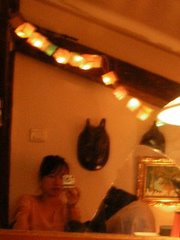
Have you ever watched TV in
Taiwan? It is very hard to find
international news. There must be at least a dozen TV news channels which broadcast all the same stuff at the same time.
Whenever I ask some Taiwanese about this phenomenon, most of them say that local people are just not interested in what is going on abroad. But what is the real cause? Are the Taiwanese TV networks not reporting about news abroad because there is no audience? Or are the Taiwanese not interested in watching international news because TV does not report it?
But maybe the main question does not even lay there or we risk falling into the unsolvable problem of the egg and the hen. As for myself, I think that it comes from the “island” mentality, predominent
in such a small country. Thus,
Taiwan besides being physically isolated, also seems to live in an abstract isolation.
Taiwan is
its own whole world.
Recently I read a Taiwanese short story called “The Clock”. It was written by Zhang Xiaofeng (張曉風) as part of her collection of short stories published in 1968, entitled Wailing Wall (哭牆). The story is about clocks and time: in a remote village of Taiwan, people start to be confused and disoriented when they realize that no clock gives the same hour. All the everyday life becomes a mess, teachers arrive 30-minutes late to class and a rivalry begins between the eastern and the western part of the village since each side relies on a different clock. The narrator is a disenchanted junior high school teacher, who goes to see a friend, a former teacher, who lives a misanthropic life, raising goats. They discuss the situation. The narrator says that, since nobody can decide which is the right time from the two main clocks of the village, why not look for a third source to decide a reliable time, for example a radio. But his friend just makes a violent diatribe against the necessity of having a radio. They don’t need a radio because they are used to living happily without knowing anything from the outside world. They know nothing about hunger in India. They are happy because they are not conscious of misery elsewhere in the world.
Is this one of the particularities of a “living-on-a-island” way of thinking? The island by its natural limits is also a castle which can protect from outside calamities, but what if the worm is already inside? In fact, the narrator is far from being happy: he seems to regret the time he lived in Kaoshiung (the biggest city in the South of Taiwan); he misses his girlfriend of that time; he was sent to the countryside after being at odds with the Head of his former school; he was punished for not conforming to the rules or local norms. A clock and the time it gives have to be normalized in order to be useful. If not, as in this story, dissensions may arise. Is it also because when we live in society, we need some norms, some rules to cling to or to bypass.
At the end of the story, the narrator lends his watch to his wife who goes to find out the right time. For the first time in a long time, he feels weird and then free without the watch he is used to wearing on his wrist. But as night descends on the village, the clouds of his dull life shadow once again his emergent hopes.
Today’s favorites
Every man lives on an island by Bob
Medias in Taiwan by Kailing Wang



